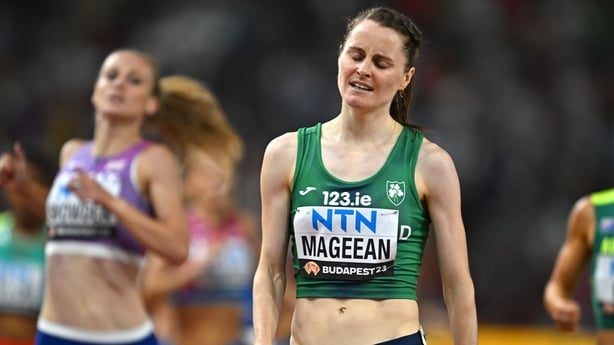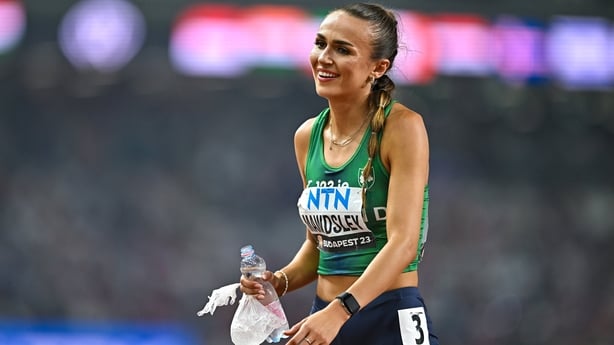Without it being a case of celebrating fourth place finishes, it's a truism that global medals have proved particularly hard to come by for Irish athletes while narrow podium misses have ended up being portents for better things to come.
Ireland has won just six medals in 40 years of World Championships outdoors and a mere three at an Olympic Games since Ronnie Delany’s celebrated gold in the 1500m in Melbourne 67 years ago.
It’s a well-worn and frankly battered cliche that fourth is the loneliest place in sport, but that kind of language can look like lazy analysis when the performance is scrutinised with any degree of detail.
Applying a modicum of such analysis to what Ciara Mageean and Rhasidat Adeleke achieved last week at the World Championships in Budapest in occupying that spot in their respective disciplines will reveal that they were, in very different ways, important stepping-stone performances.
Both briefly occupied medal positions in the latter stages of their races, which should have filled them with a sense that a place on the podium was a real possibility.
That mindset of belonging at the top table can only stand to them when, all going well in the interim, each step on the start line for their heats at the Olympics next summer.
Both were also a clear enough distance off the bronze medal not to have to trawl over too many 'what ifs’ in the aftermath of their campaigns.
They can move on and take the best bits of the week and target the areas of improvement that they will likely need to address to "finish one place better" as Adeleke commented after her final.
In addition, in Budapest each finished behind athletes whose form through the season (in Mageean’s case), or the preliminary rounds (in Adeleke’s case) was by examination, somewhat superior.
Both ran tactically well, utterly emptied the tank and need have no recriminations about what they put down on the track when the gun went in their final.
Both had the look of platform performances similar to the experiences of Sonia O’Sullivan and Eamonn Coghlan, who each finished in fourth place on two occasions at global level before becoming world champions.

For the experienced Mageean, there was an intent and confidence to her running that was considerably elevated from her silver medal at the European Championships last year, with Munich gold medallist Laura Muir well behind her in Budapest.
For Adeleke, a 35-race year which had peaked and effectively culminated 10 weeks earlier with unexpected and stellar NCAA glory, left her on a downward arc by the time she arrived in the Hungarian capital.
She made a valiant attempt in the final, brushing off the out-of-the-blocks sluggishness of the previous two rounds to move into medal contention 40 metres from the line, only to find that there was nothing left in her legs as Sada Williams finished strongly to clinch the bronze.
Both Adeleke, who has now just turned 21, and Mageean, who is more than 10 years her senior, are also on upward curves in their careers despite the disparity in age and that’s a critical feeling that will lift some of the dread from the hard-slog winter work ahead of them.
There are other Irish athletes who can use their World Championships campaigns as launch pads to ascend to semi-finals and finals in Paris next year, and among them are four more women who produced their lifetime bests in Budapest.
Sarah Healy was eighth in her semi-final of the 1500m - a race of such speed that the top-five finishers combined for the fastest, in depth, global championship 1500m race in history.
The 22-year-old from Monkstown in Dublin was towed along in the slipstream to not just an Olympic standard, but also a sub-four minute clocking, the mark of world class.
Sophie O’Sullivan’s heat performance may have narrowly fallen short, but the European Under-23 gold medallist cracked her personal best by five seconds in the race, marking an enormous 15-second improvement over the season.
Sarah Lavin’s Irish record 12.62 seconds in the 100m hurdles may not have been good enough to make the final, but with a ranking of 10th and a mere .13 of a second (about one metre of track) between her and the top eight, she knows that an Olympic final is literally within touching distance.

Sharlene Mawdsley arguably made the most improvement of any Irish athlete in Budapest. In running six races in nine days, she registered impressive anchor relay legs in four outings on the track, the last of them a barrier-breaking 49.60 in the women’s 4x400m relay.
The measure of that is exemplified by the fact that she was the fourth fastest of the 36 participants in the final and only bettered by three stars of the individual 400m in Femke Bol, Natalia Kaczmarek and Lieke Klaver.
Mawdsley has the look of a potential Olympic finalist based on her serious elevation here. Off a rolling relay start with baton in hand, she looks world class in full flight and it’s clear that coach Gary Ryan, a multiple major championship performer in his own sprinting career, has added strength in abundance to Mawdsley’s natural speed.
It’s clear though that the differential between her relay best split of 49.60 and her individual race PB of 51.17 (set in her heat last Sunday week) reveals an area of substantial improvement can be made in her blocks start, which will likely be a focus of attention in her upcoming winter work.
Semi-final performances by Andrew Coscoran (1500m) and Mark English (800m) heralded enough optimism to believe they can compete with an attainable goal of reaching at least a similar stage in Paris next year.
Coscoran came into the championships with a ranking of 12th in the world, but attaining that status had clearly taken a lot out of him by the time he lined up for his semi in which he was a distant 14th having looked well-placed with 500 metres to go.
English clocked a season’s best to qualify from his heat and improved that again to finish seventh in his semi-final but the 800m, while a deep event right now, has a very open look to it heading towards Paris in less than a year’s time.
An athlete who will have mixed feelings from her campaign in Budapest is one of the most exciting talents across the spectrum of Irish athletics.
Heptathlete Kate O’Connor looked on course for a top-10 finish or even a top-eight after garnering over 2000 points from her first two events on a great first day - the 100m hurdles and high jump.
While she still competed well to finish 13th of 23 starters, her long jump and javelin let her down on day two, but the Commonwealth Games silver medallist has the look of being Ireland’s first female multi-event Olympian in Paris next summer.


